A general webhook server for receiving Prometheus AlertManager's notifications and send them through different channel types.
weixin, Weixin Group Bot / 企业微信群机器人http(s)://<this-webhook-server-addr>/webhook/send?channel_type=weixin&token=<token>dingtalk, Dingtalk Group Bot / 钉钉群机器人http(s)://<this-webhook-server-addr>/webhook/send?channel_type=dingtalk&token=<token>feishu, Feishu Group Bot / 飞书群机器人http(s)://<this-webhook-server-addr>/webhook/send?channel_type=feishu&token=<token>weixinapp, Weixin Application / 企业微信应用http(s)://<this-webhook-server-addr>/webhook/send?channel_type=weixinapp&corp_id=<corp_id>&agent_id=<agent_id>&agent_secret=<agent_secret>slack, Slack Apphttp(s)://<this-webhook-server-addr>/webhook/send?channel_type=slack&token=<token>&channel=<channel>
More is comming...
$ cd cmd/alertmanager-webhook-adapter
$ go build -v -x
$ ./alertmanager-webhook-adapter
# see help
$ ./alertmanager-webhook-adapter -h
# Add signature for sent messages
$ ./alertmanager-webhook-adapter --listen-address=:8060 --signature "Anything-You-Like"
# the signature will be added to the begining of the messsage:
# 【Anything-You-Like】this-is-the-xxxxxxxxxx-message# Install the binary alertmanager-webhook-adpater file to some directory
# like /usr/local/bin/alertmanager-webhook-adapater
# and chmod +x /usr/local/bin/alertmanager-webhook-adapater
$ cp deploy/alertmanager-webhook-adapter.service /etc/systemd/system/
# make sure the bin path to be consistent
# ExecStart=
$ vim /etc/systemd/system/alertmanager-webhook-adapter.service
$ systemctl daemon-reload
$ systemctl startSee Features section.
- name: 'sre-team'
webhook_configs:
- url: "http://10.0.0.1:8090/webhook/send?channel_type=weixin&token=1234-1234-1234"$ ./alertmanager-webhook-adapter -h
alertmanager-webhook-adapter
Usage:
alertmanager-webhook-adapter [flags]
Flags:
-h, --help help for alertmanager-webhook-adapter
-l, --listen-address string the address to listen (default "0.0.0.0:8090")
-s, --signature string the signature (default "未知")
-n, --tmpl-default string the default tmpl name
-d, --tmpl-dir string the tmpl dir
--tmpl-lang string the language for template filename
-t, --tmpl-name string the tmpl name
| WeixinGroupBot | WeixinApp | DingTalkGroupBot | FeishuGroupBot |
|---|---|---|---|
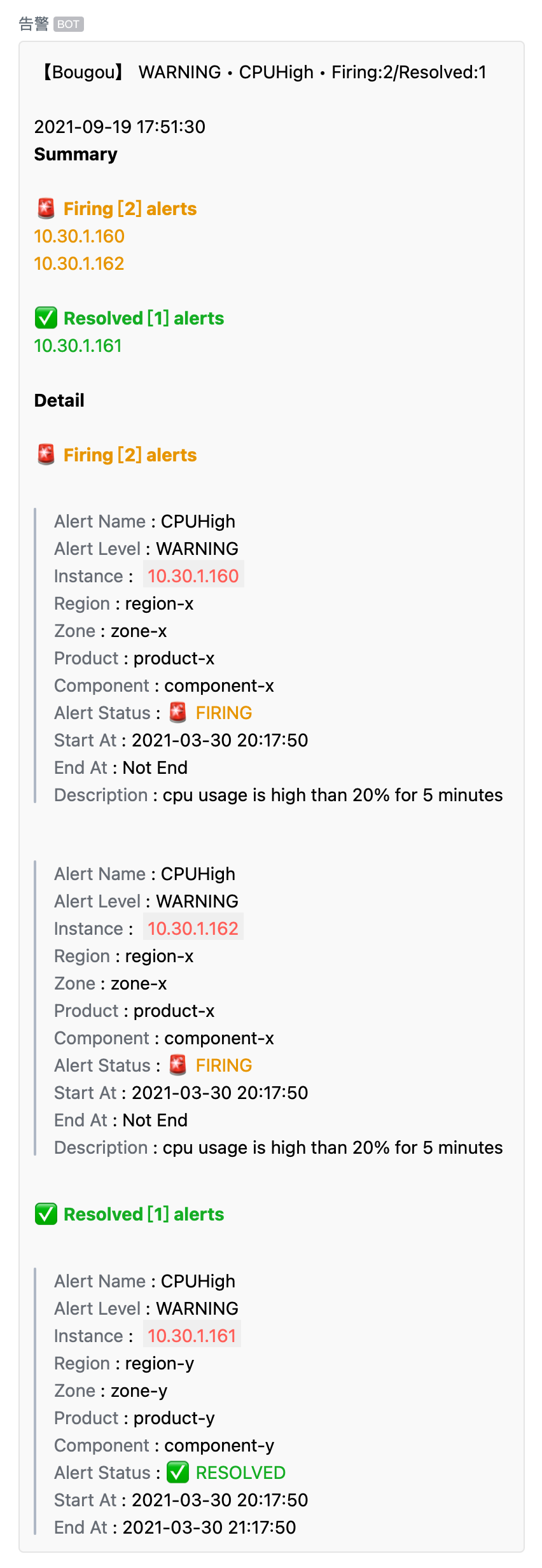 |
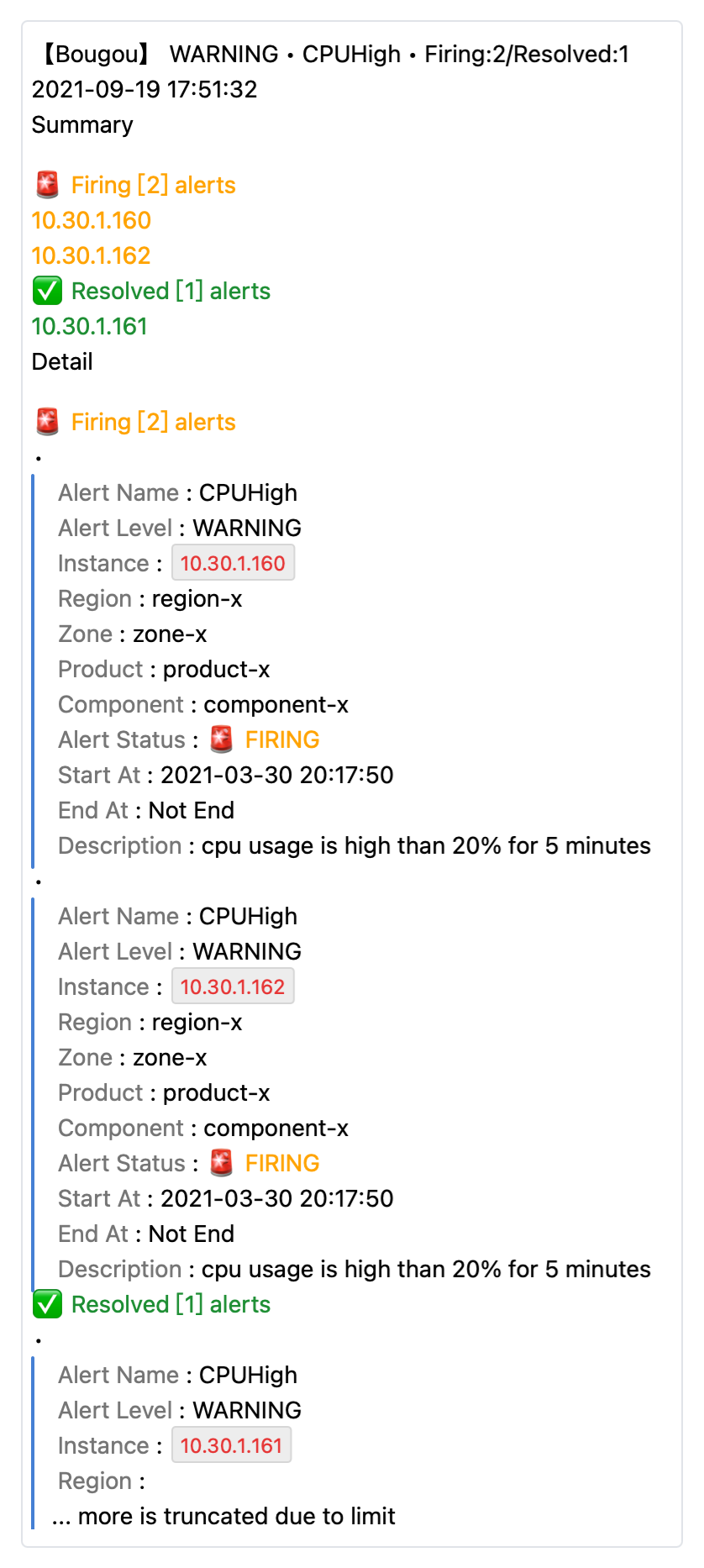 |
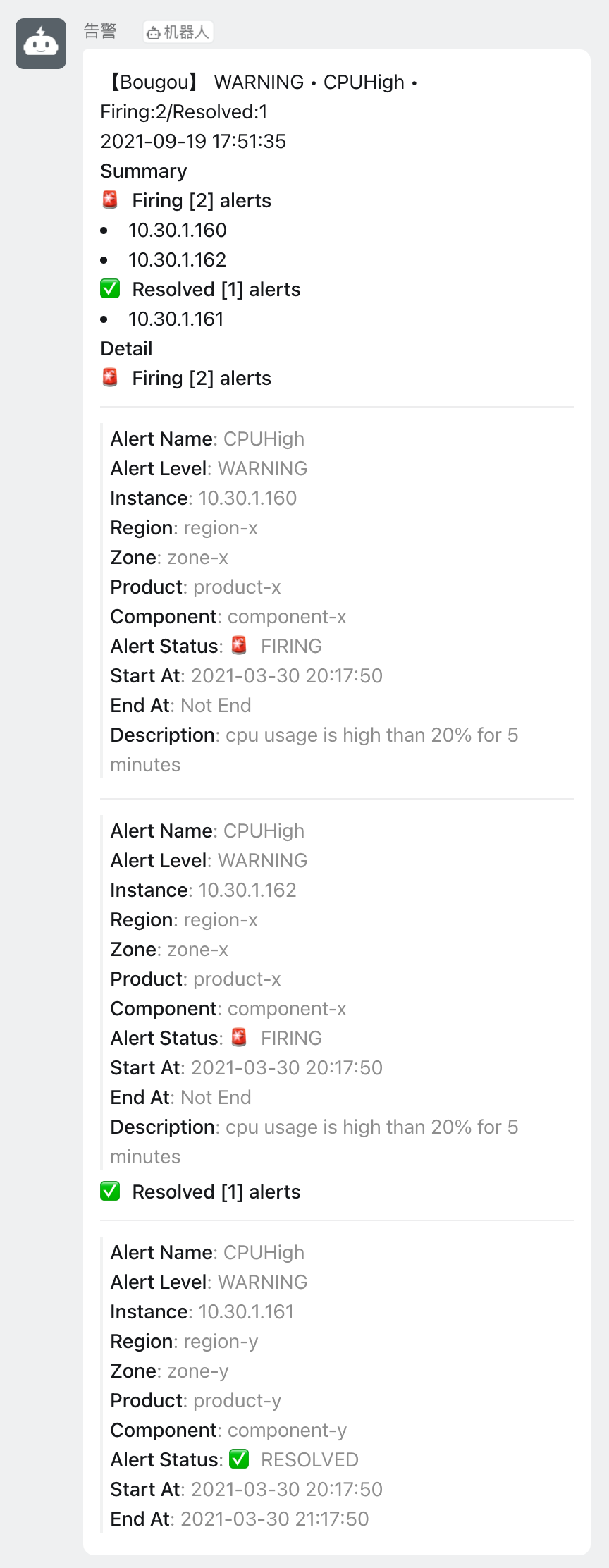 |
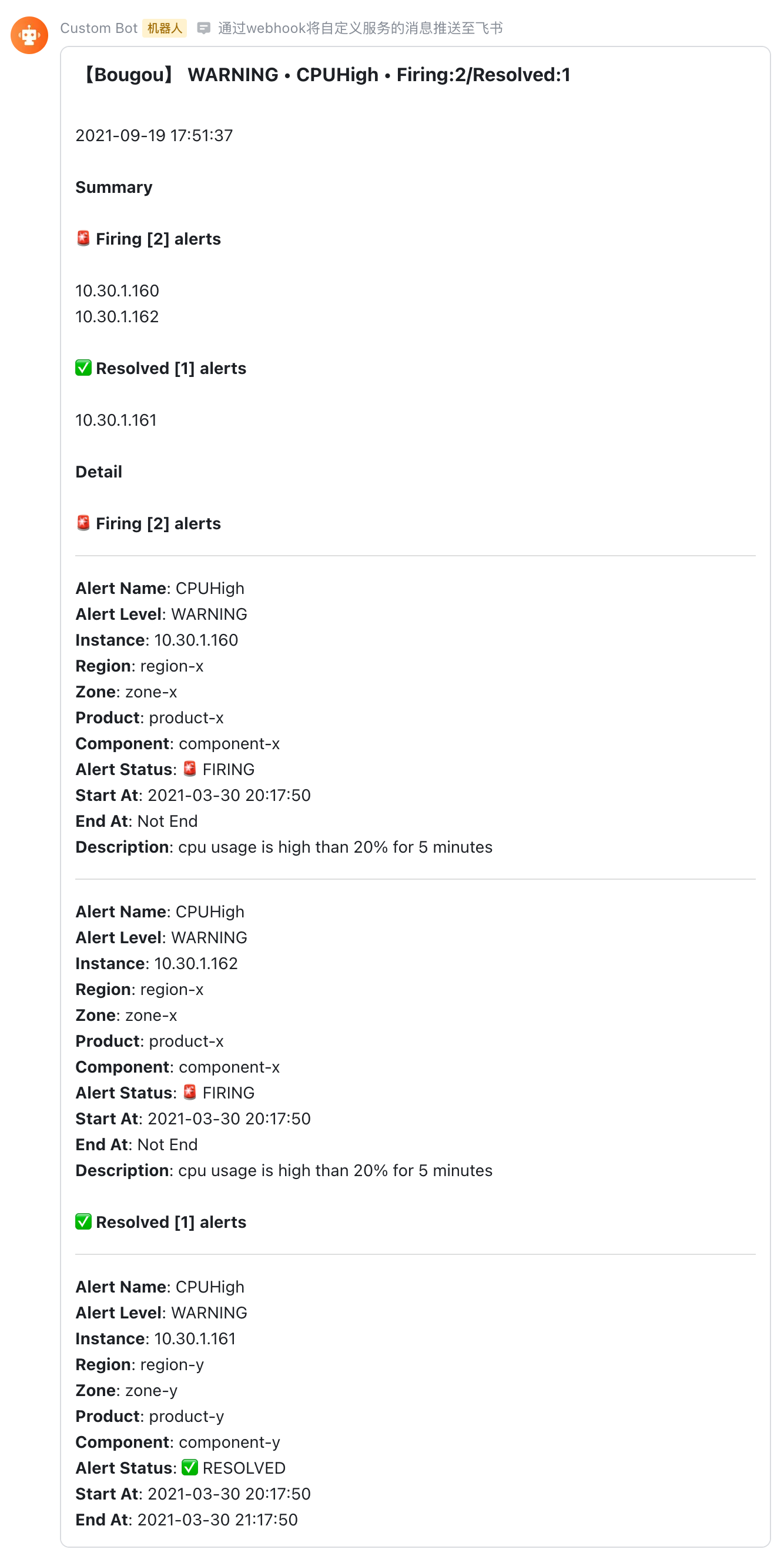 |
| Slack App |
|---|
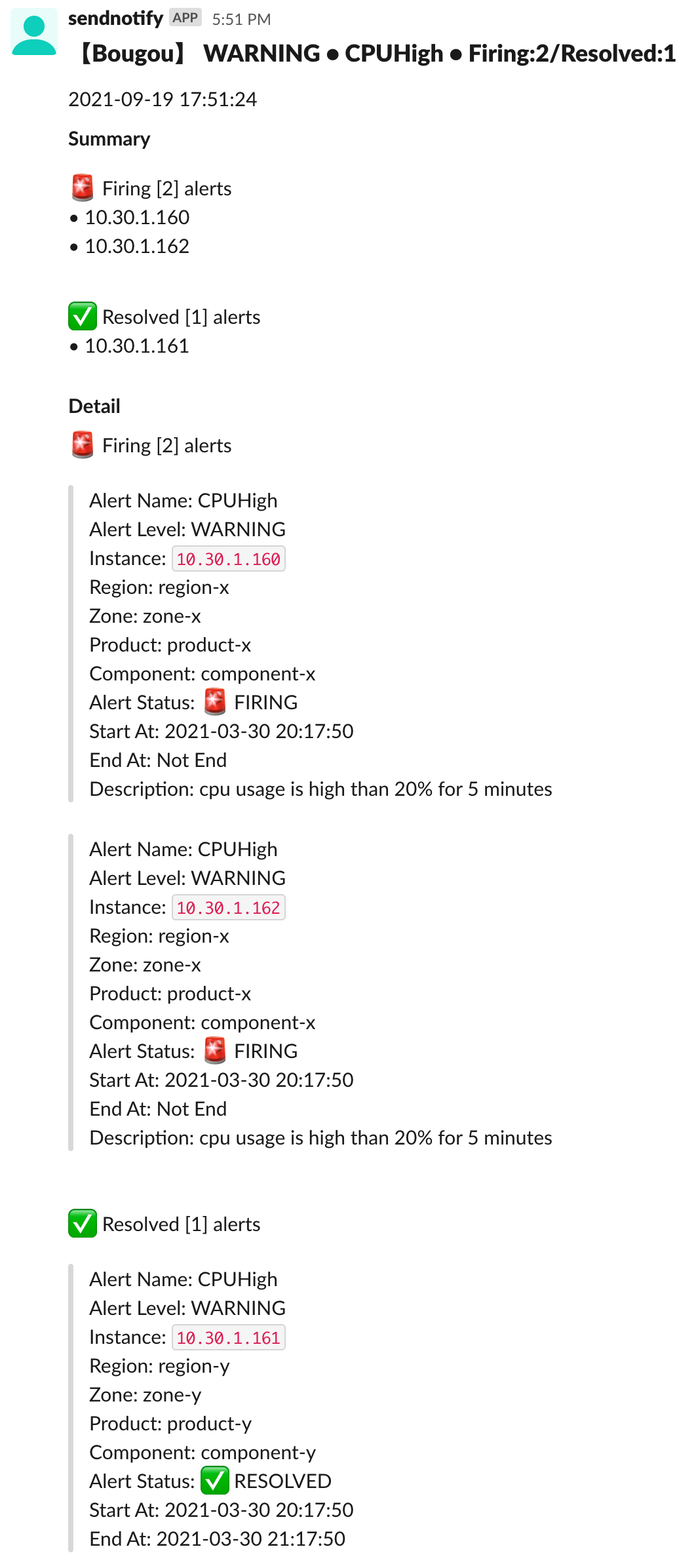 |
The project already has builtin templates for all supported notifiction channels. But you can use your own template file(s) to override those defaults.
You can use the following three options to acheive this purpose.
--tmpl-dir (-d)--tmpl-name (-t)--tmpl-default (-n)
The --tmpl-dir is a MUST if you want to load your custom templates. --tmpl-name and --tmpl-default is optional. So, there are THREE use cases when combining those options.
--tmpl-dir <somepath>--tmpl-dir <somepath> --tmpl-name <tmplname>--tmpl-dir <somepath> --tmpl-default <tmplname>
If
--tmpl-nameand--tmpl-defaultare both specified,--tmpl-defaultwill be ignored.
These three use cases are used for different purposes.
Purpose: Use different template files for different channels
First, create a dir to store your template files, like templates. And then put your template files under the template dir.
The program will try to found <channel>.tmpl files under the tmpl dir for all supported channels,
and use the founded file as the template for the corresponding channel. If not found, use builtin template.
$ touch templates/feishu.tmpl
$ touch templates/weixin.tmpl
# use templates/feishu.tmpl for feishu channel
# use templates/weixin.tmpl for weixin channel,
# use builtin templates for other channels.
$ ./alertmanager-webhook-adapter -s Bougou --tmpl-dir ./templates/Purpose: Use one custom template for all channels.
Create your own template file, like custom.tmpl, the filename without suffix will be the template name, and put it under the template dir.
The program will try to found <tmplName>.tmpl file under the tmpl dir. The choosed tmpl file will be used for all notification channels. If not found, error and exit.
# use templates/custom.tmpl for all channels.
$ ./alertmanager-webhook-adapter -s Bougou --tmpl-dir ./templates/ --tmpl-name customPurpose: Use different template files for only several channels, and use an extra template file for all other channels.
$ touch templates/feishu.tmpl
$ touch templates/weixin.tmpl
$ touch templates/default.tmpl
# use templates/feishu.tmpl for feishu channel
# use templates/weixin.tmpl for weixin channel,
# use templates/default.tmpl for other channels.
$ ./alertmanager-webhook-adapter -s Bougou --tmpl-dir ./templates/ --tmpl-default defaultThe template file should use an AlertmanagerWebhookMessage object as the input data.
type AlertmanagerWebhookMessage struct {
Version string `json:"version"`
GroupKey *json.RawMessage `json:"groupKey"`
TruncatedAlerts int `json:"truncatedAlerts"`
Status string `json:"status"`
Receiver string `json:"receiver"`
Alerts Alerts `json:"alerts"`
GroupLabels KV `json:"groupLabels"`
CommonLabels KV `json:"commonLabels"`
CommonAnnotations KV `json:"commonAnnotations"`
ExternalURL string `json:"externalURL"`
MessageAt time.Time `json:"messageAt"` // the time the webhook message was received
Signature string `json:"signature"` // 签名,如发送短信时出现在内容最前面【】
}All template files MUST define the following template parts in the template file.
prom.titleprom.textprom.markdown
When loading template files, the program defaults to try to load files with name <channelName>.tmpl or <tmplName>.tmpl or <tmplDefault>.tmpl.
But you can specify the option --tmpl-lang <lang> to change the behaviour.
If --tmpl-lang <lang> is specified, and the specified lang is NOT equal to en, the program will try to load files with name <channelName>.<lang>.tmpl or <tmplName>.<lang>.tmpl or <tmplDefault>.<lang>.tmpl. If <lang> equals to en, the default loading behaviour is NOT changed.
The <lang> can be any string, just make sure it matches your desired file names.
This project already builtin supports two languages, en for english, zh for chinese. It defaults to en if --tmpl-lang is not specified.
The
--tmpl-langonly impacts which files will be loaded, it does not care the contents of the files.